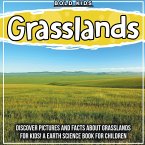Most species of plants live in a state of seasonal drought, because there is very little rainfall in a savanna. This lack of rainfall does not mean that the animals in a savanna are not able to survive, though. Savanna animals include the big five - lions, hyenas, wild dogs, crocodiles and zebras. These animals help regulate the levels of precipitation through their grazing on grasses and plants in a specific area.








